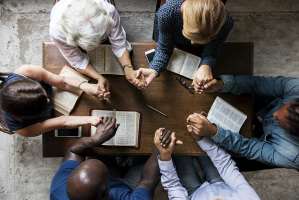How to practice real gratitude

What is one thing, situation or person for which you are struggling to be grateful?
In Andy Andrew's book, The Noticer, he begins with the story of a man who is going through a difficult season in his life, having recently lost both his parents, his job, and his home, and is taking up shelter under a local pier. As he sits under the pier eating what food he could find — sardines and Vienna sausages — another man comes by to talk with him and asks what he has to be grateful for.
The man eating his meal, hardly looking up from his food, says he doesn't have anything to be grateful for at all. The other man presses him further and asks what he's eating to which he replies, "Just some nasty canned food here under this gross pier." Kindly, the man says to him, "Well, that's a matter of perspective. See, to you it might seem like you're eating cheap canned food under a pier, but to someone else, you're dining on surf and turf with an ocean view!"
If you want to know the rest of the story, the book is definitely a great read and I'd recommend it. Throughout the book, Andrews explores the importance of perspective in our lives. One crucial perspective is that of gratitude. Just as the man under the pier learned that he had more opportunities for gratitude than he immediately recognized, we too may have things in our life that represent opportunities for us to shift our perspective.
As I reflected on this idea, I was drawn to 1 Thessalonians 5:16-18 (NKJV) which says "Rejoice always, pray without ceasing, in everything give thanks; for this is the will of God in Christ Jesus for you."
These familiar verses give some powerful commands that can be easy for us to gloss over without taking the time to appreciate fully. As I spent time reflecting on what it truly meant to give thanks in everything, I focused on a few dimensions that helped me recognize even deeper ways to understand and express gratitude.
The first concept that struck me is that:
Gratitude is universal
If we are genuinely grateful for everything, then that gratitude must be universal and encompass things we see as both good and bad. Gratitude for things we see as good is relatively easy and commonplace. Someone does something kind or helpful, God provides for a timely need, or a situation resolves in a desired way — all of these are times when our gratitude may happen naturally. In these cases, our response of gratitude may even be prompted by our feelings; we feel good about what happened and choose to express that positivity by saying thank you.
That's the easy way. That's the kindergarten-level stuff.
The real challenge comes when we may not naturally recognize something as positive from our perspective. What if someone does something that appears hurtful, God does not provide for a need in the way we asked, or a situation stays unresolved? In these cases, our natural, feelings-led response is probably not happiness and an outpouring of gratitude. Instead, we would be more inclined to be sad, complain, or maybe even lash out in anger.
In situations we don't see as positive, if we are to be grateful for everything, we must challenge our own perspective of things and recognize that whether we perceive something as good (for us) or not, God has a larger perspective.
I want to pause and recognize that this can come across as platitude, but I don't mean it that way. I'm talking about wrestling with the real, raw challenges of life and sitting long enough with things that are difficult and uncomfortable to a place where you can say "I don't like this and I may not understand it, but I am choosing to be grateful for it."
This is where gratitude gets hard. That's a post-graduate level gratitude.
As I reflected on these dimensions of gratitude for good and bad, I found it interesting that the closer we are to a situation the more negatively we might perceive it because we haven't had enough time to see the benefit from what happened. That same event, when reviewed sometime later, might have obvious upsides which were not evident immediately.
What if we were able to cultivate a perspective in our lives where we intentionally choose a grateful response, no matter how good or bad things feel in the moment?
This led to my next consideration:
Gratitude is timeless
Beyond being grateful for the good and bad, we also have the ability to express gratitude for the past, present, and future. As we build our perspective of gratitude, we can learn to express that gratitude even before our feelings would naturally lead us to do so.
Looking at our past, we can express reflective appreciation for what we have received. This means we pause and look at the events of our life and recognize there was a purpose for what we experienced. Whether we felt good at the moment or not, our ability to look back and find benefits from our past is a powerful exercise in acknowledging God's sovereignty in our lives.
I have had plenty of situations in my own life that were uncomfortable, unpleasant, or even painful at the time and my natural response was to wonder why it was happening as I went through it.
If expressing gratitude for our past is a way to demonstrate reflective appreciation, then in the present, gratitude means expressing humble acknowledgment of our needs. Real gratitude is a demonstration of humility because it means we have to accept that we are not self-sufficient. Our reliance on others and especially God can keep our pride in check. Showing gratitude at the moment is a great way to cultivate a deeper sense of personal humility and reliance on God.
Those moments when we feel we have everything under control and don't need anybody else might seem like mountaintop experiences, but they can actually serve to isolate us. We lose sight of our dependence on God and our interdependence with other people. Pride can set in and we can discredit the value that others add to our lives. Remembering at all times that we have needs that are best met by others requires a developed sense of humility that can fight against our own prideful tendencies.
We can even show gratitude for the future which shows up as faith-filled anticipation. Just as we can use our imaginations to fear the worst, we can shift our perspective to thanking God for who He is and for our confidence in what He is yet to do. Drawing our reflection that He has done good in the past and our acknowledgment that He is capable of meeting our present needs is the fuel that equips our ability to anticipate and thank Him for the work He is still accomplishing. This bolsters our confidence that God is good, builds our overall faith and trust in Him, and it can strengthen our hope for what is to come.
When we put all of these ideas together, it's powerful to recognize that in the good, the bad, the past, the present, and the future we have the opportunity to choose a perspective of gratitude in our lives. Being grateful won't always be the same as feeling grateful; it comes down to a choice.
Most importantly, we need to remember that:
Gratitude is biblical
The obvious part here is the verse telling us to give thanks in everything. But Scripture doesn't just give us the command; it provides numerous powerful examples, both good and bad, of the impact of gratitude. In some of the examples, lacking gratitude led to major consequences and loss. In others, a heart of gratitude was evidence of great faith and was part of miraculous change.
To find examples of some not-so-great displays of gratitude, there's no need to look further than the people of Israel after leaving Egypt. These examples are numerous. I've summarized some of the big events from Exodus through Numbers below.
- Exodus 14-15: Immediately after crossing the Red Sea and hearing the joyful songs of Moses and Miriam, the Israelites went three days with no water and we see their first instance of complaining rather than being grateful for God's deliverance. They find bitter water and God works a miracle to make it potable.
- Exodus 16: The Israelites complain about not having food. God hears them and promises manna.
- Exodus 17: The Israelites question Moses' leadership and doubt God. God gives them water from the rock after Moses strikes it at God's command.
- Exodus 32: The Israelites are at the base of Mount Sinai, which is covered with God's glory while He gives Moses the Law. The Israelites grow impatient and commit idolatry with the golden calf rather than giving God the praise due Him.
- Numbers 10-11: After just over two years at the base of Mount Sinai building the Tabernacle, they depart, following God's presence. They immediately begin complaining about their misfortunes, so God sends down fire, which he stops after Moses intercedes. Then they complain again about having to eat manna, Moses gets frustrated, and God sends an abundance of quail, and strikes them with plague.
- Numbers 13-14: Spies are sent into the promised land, and fearful Israelites say they want to go back to Egypt and blame God for their troubles. God threatens to disinherit the Israelites. After Moses intercedes, God punishes doubters by not allowing them into the Promised Land but says He will still fulfill His promise.
I could go on, but in each of these situations, the Israelites chose to focus on the negative situations they were in rather than reflecting on God's goodness, acknowledging their dependence, or anticipating God's provision. As a result, each situation represents a failure on their part and brought about certain consequences, even with Moses' constant intercession on their behalf. Every situation presented the opportunity for God's people to show gratitude in some way, but they missed the benefits of choosing that path.
Thankfully, Scripture provides positive examples of gratitude as well. Each of these serves as a reminder of what God can do with a heart that is surrendered to Him in obedience and gratitude.
Luke 17:11-19 presents the story of 10 lepers who Jesus healed. Only one returned to express his gratitude for what Jesus did for him. The passage shares a striking example of how rare but impactful it can be when someone reflects on God's goodness and thanks Him. When the man returns, Jesus says to him, “Were not ten cleansed? Where are the nine? Was no one found to return and give praise to God except this foreigner?" And He said to him “rise and go your way; your faith has made you well.” In this, Jesus shows us the connection between man's reflective appreciation and a faith that healed both his body and spirit.
A shocking example of gratitude comes from Jonah 2:9-10 at the end of Jonah's prayer from the stomach of the great fish. This might be one of the most unexpected places we would expect to see someone telling God they are grateful, yet Jonah does. He declares, "But I with the voice of thanksgiving will sacrifice to You; what I have vowed I will pay. Salvation belongs to the LORD!" What a powerful reminder that we can truly be thankful to God in anything. It would be harder to find a more dramatic example of someone's humble acknowledgment of God's grace!
Perhaps a close rival would be the example we have of the Apostle Paul in Acts 27:33-36 who, after two weeks stuck in a grueling storm at sea, led a pre-meal prayer for a group of weary sailors when "he took bread, and giving thanks to God in the presence of all he broke it and began to eat." He was in the presence of people at their very worst — exhausted, hungry, and fearful of death — and he showed his gratitude as an expression of his faith-filled anticipation of God's preservation of their lives.
Each of these examples from the Bible shows us a different dimension of gratitude from which we can learn. I, for one, do not want to follow the pattern of the Israelites who complained at each step of their journey. I would much rather be like the grateful leper who recognized Jesus as the One to whom all his gratitude was due and received a transformed life as a result.
Concluding thoughts
In The Noticer, Andy Andrews says "Whatever you focus upon increases ... When you focus on things you need ... You'll find those needs increasing. If you concentrate your thoughts on what you don't have you will soon be concentrating on other things that you had forgotten you don't have — and feel worse! If you set your mind on loss, you are more likely to lose ... But a grateful perspective brings happiness and abundance into a person's life."
The more I reflected on all of this, I realized that's how I want to characterize my life — gratefulness. Gratefulness for the good and the bad. Gratefulness for the past, present, and future. Gratefulness that is Biblically motivated. Will you join me in choosing gratitude?
What is one thing, situation, or person for which you will choose to be grateful?
Patrick Smith is an International Coach Federation (ICF) certified coach who specializes in leadership development, personal strategy, and career coaching. He is the Director of Training & Development at Christian Care Minsitry/Medi-Share and has been with the ministry for over eight years.



























